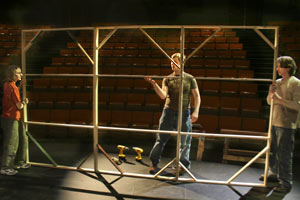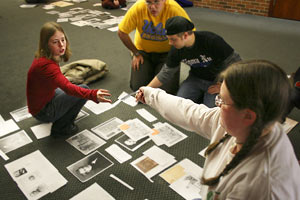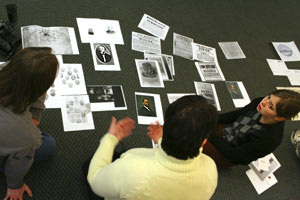

Venture Boldly

Office of Communications
2 East South Street
Galesburg, IL 61401

Students in a history class at Knox College aim to make history come alive on March 11, as they assemble a life-size replica of the Lincoln-Douglas Debate site at Knox's Old Main. The model, 30 feet wide and seven feet tall, represents part of the east wall of Old Main, including the window through which the debaters and other local dignitaries climbed on October 7, 1858, because the debate platform had blocked the door.
The 16 students in professor Catherine Denial's course in Public History will display the model from 10 a.m. to 4 p.m., Tuesday, March 11, in the lobby of Ford Center for the Fine Arts on the Knox campus in Galesburg. The display is free and open to the public.
The students also will dress in period clothing and re-create for visitors some of the people who were at Old Main for the debate. But the students are bypassing the famous orators, Abraham Lincoln and Stephen Douglas, in favor of the experiences and opinions of 16 ordinary people, typical of those in the crowd at the Galesburg debate, estimated at more than 10,000 -- believed by some historians to have been the largest audience among the seven debate sites.
Knox's 'Old Main' is a National Historic Landmark and the only building remaining from the 1858 Lincoln-Douglas Debates.
"Earlier in the course, we researched effective ways to communicate history," said student David Nolan. "One of the ways to make history come alive is to interact with the audience."
Each student in the class developed a package of background information on a particular type of person who might have attended the debate, Nolan said. "Some of the characters are based on historical figures, such as a wealthy local landowner, and some are composites, such as a Knox College student who came from a farm in Iowa."
The model also will feature displays created by the students exploring politics, religion, race and gender relations, and other issues of the 1850s.
Researching public attitudes of the 1850s, "we definitely got an idea of what people were like," said student Ike Glinsmann. And sometimes it was "disconcerting and unnerving" Glinsmann said, to discover the prejudices that were prevalent in the 1850s.
"There were prayers of thanksgiving offered when the Irish Catholic Church in town was blown down in a storm," Glinsmann said. In the 19th century, anti-immigrant attitudes were widely held, and many abolitionists who were opposed to slavery also opposed civil rights for blacks, the students said.
The model and the student presentations will be offered again on the Knox campus this fall at a meeting of the Lincoln Colloquium in October, and again in late October for Knox College's Homecoming Weekend.
Founded in 1837, Knox is a national liberal arts college in Galesburg, Illinois, with students from 45 states and 44 nations.

Working in Harbach Theatre, students Sarah Patterson, David Nolan and Martin Helms assemble part of the model of the east wall of Old Main, site of a Lincoln-Douglas Debate.

Students check their materials for a display on the 1858 Lincoln-Douglas Debate at Knox.

History professor Catherine Denial, center, confers with students creating a display about the Lincoln-Douglas Debate at Knox College.
Published on March 06, 2008